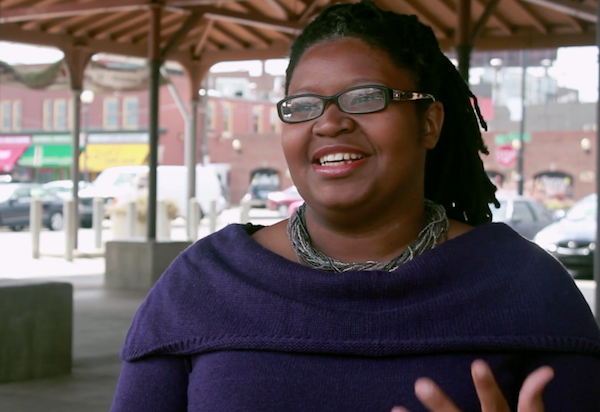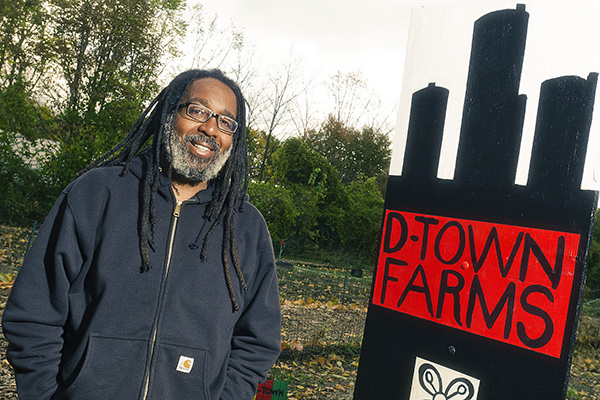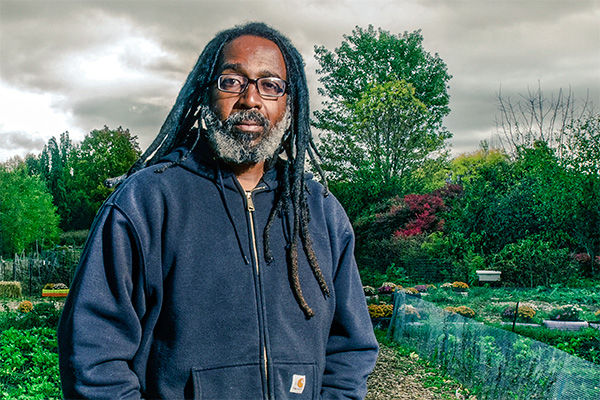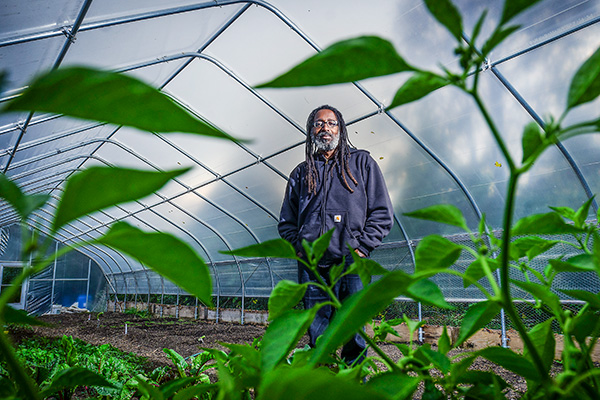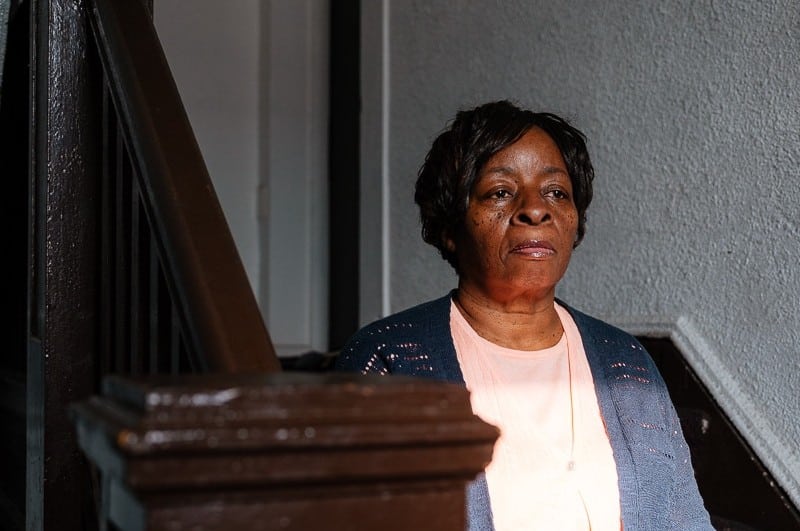Creating a cultural shift in how Detroiters think about food
A combination of grass roots programming and improved access to fresh food in neighborhoods is helping change the way Detroit eats.
Detroit is a city where conflicting narratives around food can cloud the issue of food access. On the one hand, there’s the popular notion that Detroit is a “food desert” – a city where people don’t have healthy food options in their neighborhoods. On the other, there’s an idea that the city is a latter-day urban agriculture utopia, a place where back-to-the-land farmers can grow kale for all. The truth of the situation, however, lies somewhere in the middle.
What we do know is that eating healthy remains a challenge for many Detroiters, resulting in what’s effectively become an obesity epidemic. A study by Alex B. Hill of the Detroit Food Map found that whatever is causing the high rates of obesity in Detroit, a lack of access to fruits and vegetables isn’t it. Eighty-seven percent of obese African American adult Detroiters surveyed reported that they lived within a one-mile radius of a store with at least 15 varieties of fruits and vegetables, and the vast majority of those (72 percent) said it was easy to walk to the store.
And though access to healthy food has only improved in recent years as national chain supermarkets have begun locating in the city, choosing healthy foods is still a challenge for many residents. But the combination of grass roots programming and the addition of conventional fresh food options are starting to make an impact on the public health of the city.
In just a few short years, three national chain supermarkets have opened in the city, something that had not happened in decades. Whole Foods now serves workers and residents in Midtown, and Meijer offers low-priced groceries to residents of some of Detroit’s outer neighborhoods.
“I think the most impactful thing begins with our team member base,” says Adrian Lewis, store leader of the Meijer store at 8 Mile Road and Woodward Avenue. “I would estimate 80-90 percent of our team members are from the city, and we’re hearing how proud they are of our store and what we are offering the community from a freshness perspective. It’s very important for the community to go into the store and see fresh produce and a clean environment.”
Jay Mahabir, who runs the Meijer store at W. McNichols and Grand River Avenue, points out that their location on the site of the old Redford High School is one of the chain’s only stores located in a residential area. “We are the neighborhood Meijer,” he says.
Meijer’s store managers say the community has welcomed them, and that they see their stores as being anchors for additional retail development in the city’s neighborhoods. “I think it raises the bar for any business of any industry,” Lewis says. “I take pride, myself, for being the pioneer of that.”
While big chain stores are one aspect of food access, they are only part of the solution to helping Detroiters choose healthier foods.
Stores like Meijer might be improving food access and food security, says Malik Yakini, founder and executive director of the Detroit Black Community Food Security Network, but he claims they don’t do much for food justice. “People coming into the community from outside the community and opening stores addresses food insecurity and access to food, but it is still extractive. It does nothing to address inequity,” he says.
The Detroit Black Community Food Security Network runs D-Town Farm at Rouge Park, a buying club for natural foods and supplements, and is working to create a co-op store that will keep profits within the collective ownership drawn from the community. Yakini believes there needs to be a real effort on the part of financers and foundations to address inequities in who can open businesses in the city and which projects are deemed worthy of investment. “The ability to get financing for large scale projects doesn’t appear to be as readily available as it is to young whites moving to Detroit and opening businesses,” he says. “There are all kinds of reasons why projects by black entrepreneurs are not considered capital ready, and racism runs all through that — who is capital ready, who has collateral, why they have collateral, and which people have connections to people who have money.”
Several other programs have been bringing fresh food to neighborhood places in recent years. Eastern Market’s farm stand program brings fresh produce to people who might not be able to access the market on Saturdays, and the Detroit Community Markets group has helped grow neighborhood farmers markets in all areas of the city.
Kibibi Blount Dorn, program manager of the Detroit Food Policy Council, says that her program has helped neighborhood groups make farmers markets more sustainable. “Having that expertise to fall back on, being able to facilitate [markets], being able to accept Bridge cards and Double Up Food Bucks tokens — those kinds of cross sector connections are really critical to sustain them.”
Blount Dorn points to a number of other successful programs that have begun to make an impact on healthy food access in the city. For example, the Green Grocer program at the Detroit Economic Growth Corporation provides assistance to independent neighborhood grocers to upgrade their facilities to provide fresher food, as well as raises their profiles among consumers through events like “grocery crawls,” one of which was recently held in Southwest Detroit. The Detroit City Council passed an urban agriculture ordinance in 2013 that recognizes agriculture as a permitted land use, and is looking into adopting an ordinance governing animal husbandry.
Equity, sustainability and local focus are the three driving principles of the Michigan Good Food Fund, a new public-private loan and grant fund that will provide capital and business assistance to healthy food projects in underserved communities throughout Michigan. The fund is aimed at projects all along the food chain, from farms and other growing operations to distribution and retail. The goal is both to increase access to healthy food and to leverage the unique assets of Michigan’s existing food infrastructure to increase economic development and jobs.
In Detroit, the Michigan Good Food Fund is hoping to finance projects like the 2013 redevelopment of Parkway Foods on East Jefferson, which, with $1.2 million in grants and loans from the state of Michigan and local economic development groups, nearly doubled the size of its produce department and sparked development of four other stores in the retail strip. The Michigan Good Food Fund also piloted the use of Double Up Food Bucks, a program which allows shoppers to use tokens that double the value of SNAP (Bridge card) benefits to use on produce at supermarkets.
Affordability of food is still a huge issue in the city, Yakini says, and one the food movement has yet to address satisfactorily. “People have to be able to afford good food, but on the other hand food is chronically underpriced because the costs are externalized,” he says. “People are struggling to afford what food costs now. At the same time we understand that farmers, farm workers, and people working in food processing plants also need to be paid a fair wage. That’s the primary question the food movement has to answer.”
Food is one of the most personal of our basic needs. What, how, where, and with whom we eat are reflections of our socioeconomic status, our culture and our family history as well as our personal preferences and ethics. But food is also part of a huge and complex system – and getting people to understand that is one of the challenges to making changes, says Blount Dorn.
“What we have found, for people outside of food system work, there is not a lot of awareness of food issues and policy, so one of the big starting points for us has been raising awareness about what food systems are and how to support a strong local food system,” she says. “It’s not a simple one-off solution to most of these problems. To be able to move the needle in terms of food access and food security, we want average citizen and policy makers to be engaged in growing understanding and a cultural shift in terms of the way we think about food.”
This story is part of a series of solutions-focused features and profiles about the programs and people that are positively impacting the lives of Michigan kids. The series is produced by Michigan Nightlight and is made possible with funding from the W.K. Kellogg Foundation. Read the previous story in this series here.
